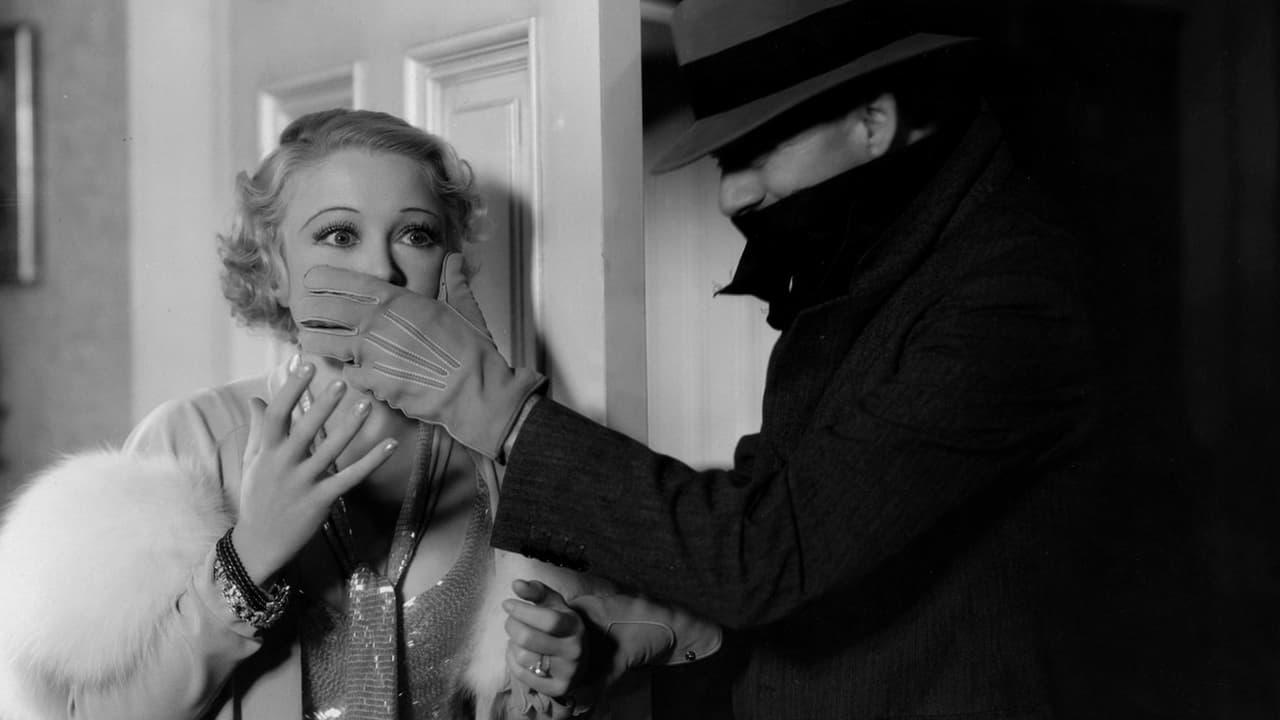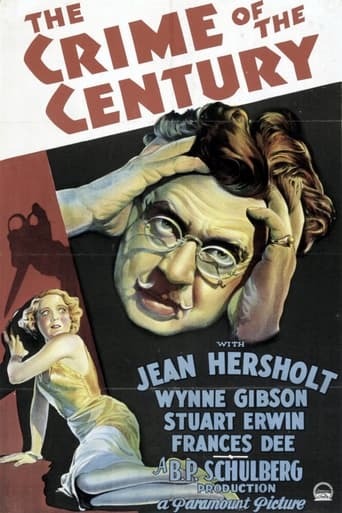




It's not great by any means, but it's a pretty good movie that didn't leave me filled with regret for investing time in it.
View MoreIt isn't all that great, actually. Really cheesy and very predicable of how certain scenes are gonna turn play out. However, I guess that's the charm of it all, because I would consider this one of my guilty pleasures.
View MoreStrong acting helps the film overcome an uncertain premise and create characters that hold our attention absolutely.
View MoreWhile it doesn't offer any answers, it both thrills and makes you think.
View MoreA mystery the way they used to make them, full of clues, an on screen detective and the expectation that the audience is working hard to make sense of everything. Near the end, they stop the film and an announcer appears to give the audience a minute to guess.The murderer is hard to guess, and this also has some interesting genre features. One is that the main suspect turns himself in before the crime. What mars this is that we have that one anti-cinematic device: the lights go out and events happen without us being able to see them. All crimes happen on-screen, but the crime itself is occluded. This happens twice, each time there is a murder.As a narrative device, we have evolved away from this one, and I guess I am sad to see it go, because with it, you have purity: everything essential happens in front of you. But evolved away we have, to be replaced by off screen unknowns.We have also lost the character who is our on-screen detective, but not as a result of cinematic development. These guys just faded from life in general, the newspaper crime reporter. That is a loss too.
View MoreDr. Emil Brandt (Jean Hersholt) staggers into a police station and confesses to murder ... only problem is he hasn't committed it yet. However, he has figured out all of the details and confesses what he intends to do to the police. He is a hypnotist and psychologist and his work involves turning people away from criminal activity. One of his current patients is a bank president who is feeling the urge to steal - Philip Ames. Brandt has already given him a command while under hypnosis - to bring him one hundred thousand dollars - a little over a million dollars in today's money. Tonight, when Ames returns to Brandt's house, it was Brandt's plan to put him under as he usually does with hypnosis, then take the money, kill Ames with a single wound to the heart, then dissect his body and dispose of it. The police would be searching for Ames when the money was discovered missing, but they'd be looking for a live thief not a dead victim of hypnotic suggestion.Brandt confesses all of this because he is a moral man, is horrified by his own thoughts, and wants to be stopped before it is too late. How did things get this far? Because the moral Brandt is married to a very immoral woman, and she's been suggesting that she will leave Brandt unless their financial situation improves. The police say they can't arrest him for what he hasn't done but they will come to his house and make sure he doesn't carry out his plan. Brandt is thankful and relieved.In spite of all of these precautions, Brandt does wind up - seemingly alone - in a room with his wife and a hypnotized Ames. The lights go out. Brandt's treacherous wife screams, hears a scuffle, then wrestles with someone in the dark, then flees into the street looking for help. The person who comes to her aid is crime beat reporter Dan McKee (Stuart Erwin). When the lights come back on Ames is dead in the manner described by Brandt in his plot, the money is gone, and Brandt lies next to Ames unconscious from chloroform.McKee wants to bust this crime wide open for his paper, but he has to work around the police and deal with the fact that there are so many suspects - Brandt's daughter, Brandt's wife and her lover for obvious reasons, Brandt himself, the police who knew Brandt's plans, maybe even Brandt's servants - had they been snooping on private conversations?. Then there is some mystery man who shadows Brandt from the beginning of the film up to the time of the murder. Could he have done it? Brandt's daughter seems innocent enough, but she could have gotten into the house any time, plus McKee is sweet on her. Could she be the killer? What is unique and rather William Castle-like about this film is that about 15 minutes before the end the film is stopped and an announcer comes out and says that this film is moving so fast that the viewer doesn't have time to figure out who did it, so a brief intermission is declared as all of the suspects are shown on the screen while the intermission clock counts down. Then the film concludes.I really liked this one. Although you are led to believe Jean Hersholt is going to be the lead in the beginning, it is actually Stu Erwin's picture most of the way, and he rises above his normal corn-fed supporting man image and comes across true as the hard-working crime beat reporter confident he can get the killer, get the story, and get the girl, even though it might be the girl herself or her father that he winds up sending to the electric chair.
View MoreCrime of the Century "Alienist" (thats the term they use) arrives at the police station asking to be locked up. It seems that as well as being able to get people and criminals to confess he thinks he's come up with a way to get people to do evil things. He's come up with the idea of getting some one to commit a robbery and then kill them to cover the crime. Afraid he'd do it he's gone to get himself locked up. The police think he's mad and the police Captain takes him home. From there the tale spins out in a story of murder and robbery. Despite the lofty title the film is neither the film of the century and the crimes in it don't make up the crime either. An okay mystery the film bogs down with some performances that just seemed flat. Jean Hersholt (You know him best for the ward given at the Oscars every year) is good as the frantic alienist, as is the woman playing his daughter, however the police and the reporter seem to to really care. How can I get excited about mystery when the people charged with solving it are so low key, I mean their well written dialog which is full of snappy one liners just sort of lays there.It's an okay film, I just wish it was better
View MoreI'm not an expert on William "One Shot" Beaudine, but I would venture to say that with a nickname like "One Shot" that you probably weren't so highly regarded as a film artist. From the films I've seen of his, I tend to be unimpressed and not very entertained. However, after a deep sigh at seeing his name in the opening credits, I spent the rest of the movie being happily entertained.Crime of the Century is for fans of the 1930s-styled whodunits. It has the classic elements of what you would expect from an old mystery - a murder taking place in the dark with many suspects; an ensemble cast; a reporter who is one step ahead of the detective; the prime suspect is of course, the most innocent; and, an unexpected twist in the end. This film seemed to be very conscious of its' genre. There is a wonderful old-fashioned moment near the end when a narrator comes on-screen and gives us a short intermission to let the audience of the film take time to guess the murderer. The filmmakers' reasoning is that when reading a mystery novel, you have time to put the book down and think before you finish the end and films never offer you that opportunity. This was a refreshing moment and a great example of how this movie tries to be as original as it can.The cast is very good. Stuart Erwin comes off better here than he did in a very similar film and role a year earlier in Before Dawn. Jean Hersholt is heartfelt and convincing as the doctor who tries to prevent himself from making a grave mistake. Look for Samuel S. Hinds in an early role as the poor hypnotized victim. The film moves along at a brisk pace. There are enough camera moves to make the film visually interesting and the film was made at Paramount and the production values really help for this type of film. The plot is about a doctor who goes to police to prevent him from killing a man who stole money for him. However, when the man ends up being dead the doctor becomes the prime suspect and it's up to the reporter to find out who was behind it. Crime of the Century is an excellent forgotten whodunit and is a must for fans of these drawing room mysteries.
View More